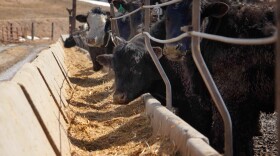
Dan Charles
Dan Charles is NPR's food and agriculture correspondent.
Primarily responsible for covering farming and the food industry, Charles focuses on the stories of culture, business, and the science behind what arrives on your dinner plate.
This is his second time working for NPR; from 1993 to 1999, Charles was a technology correspondent at NPR. He returned in 2011.
During his time away from NPR, Charles was an independent writer and radio producer and occasionally filled in at NPR on the Science and National desks, and at Weekend Edition.Over the course of his career Charles has reported on software engineers in India, fertilizer use in China, dengue fever in Peru, alternative medicine in Germany, and efforts to turn around a troubled school in Washington, DC.
In 2009-2010, he taught journalism in Ukraine through the Fulbright program. He has been guest researcher at the Institute for Peace Research and Security Policy at the University of Hamburg, Germany, and a Knight Science Journalism fellow at the Massachusetts Institute of Technology.
From 1990 to 1993, Charles was a U.S. correspondent for New Scientist, a major British science magazine.
The author of two books, Charles wrote Master Mind: The Rise and Fall of Fritz Haber, The Nobel Laureate Who Launched the Age of Chemical Warfare(Ecco, 2005) and Lords of the Harvest: Biotech, Big Money, and the Future of Food(Perseus, 2001) about the making of genetically engineered crops.
Charles graduated magna cum laude from American University with a degree in economics and international affairs. After graduation Charles spent a year studying in Bonn, which was then part of West Germany, through the German Academic Exchange Service.
-
Most beef cattle receive antibiotics in their feed to prevent liver abscesses while eating a high-energy diet. There's growing pressure on feedlots to stop this — and some have. But it's costly.
-
Investigators who are trying to track down the source of E. coli in romaine lettuce have seen this movie before. They're tracking the exact strain of bacteria that caused a small outbreak a year ago.
-
The proposed changes to food stamps, now called SNAP, would be drastic: About half the benefits would be boxed-up, nonperishable foods. Recipients would lose a lot of their ability to pick their food.
-
A record-setting "dead zone," where water doesn't have enough oxygen for fish to survive, has appeared this summer. One major cause is pollution from farms.
-
The yogurt entrepreneur who set fire to his factory remains in prison, but he's in better spirits now. "He's dreaming again," says his wife.
-
In a long-awaited ruling, the agency said that a salmon created to grow faster is fit for human consumption. Environmental and food safety groups vow to fight the decision.
-
Some organic farmers are protesting a new system Whole Foods is using to rate its suppliers. They say the system devalues the organic label because nonorganic producers can earn the highest grades.
-
U.S. requirements for meat to be labeled by country of origin may be in jeopardy after a recent World Trade Organization ruling. Or, maybe not. The U.S. is taking its time to contemplate the next move.
-
The FDA ruled that changing the name high fructose corn syrup to "corn sugar" would cause confusion.
-
Two new studies, published in the prestigious journal Science, suggest that one class of insecticides poses a more serious threat to bees than government regulators realized.










